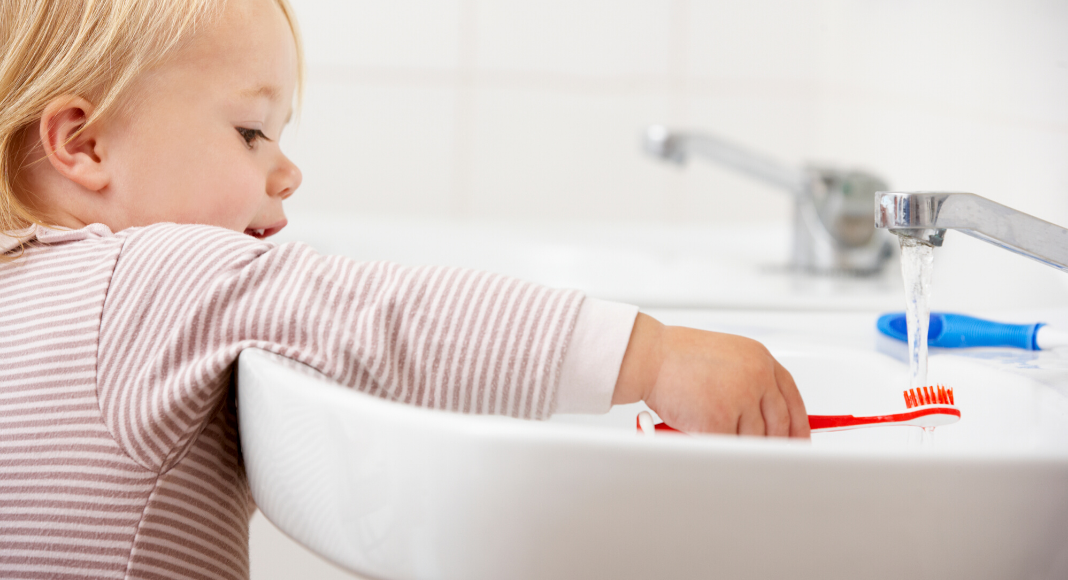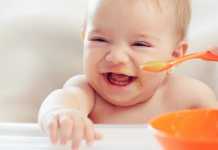 When my elder daughter was about 4, I figured it was a good time to take her in to see a pediatric dentist. I brushed her teeth twice a day, gave her only water at bedtime and flossed (occasionally). So I figured I was doing pretty well at keeping her teeth healthy. And for the most part I was; on the outside, her teeth looked fine. But inside, she was one step away from developing a cavity after years of plaque hiding unseen between her tight teeth.
When my elder daughter was about 4, I figured it was a good time to take her in to see a pediatric dentist. I brushed her teeth twice a day, gave her only water at bedtime and flossed (occasionally). So I figured I was doing pretty well at keeping her teeth healthy. And for the most part I was; on the outside, her teeth looked fine. But inside, she was one step away from developing a cavity after years of plaque hiding unseen between her tight teeth.
“Early cavities are a common problem among children,” says Tonia Braxton, office administrator for Children’s Dental Group of South Carolina, a pediatric dental practice in Irmo. “But they can be prevented.”
“In our years of experience,” Braxton says, “we have found that childhood tooth decay is due to lack of education. Parents don’t know how to care for their child’s teeth or they think they are ‘just baby teeth’ so why take care of them or treat them?”
Starting a good dental routine while your children are infants will set them up for brighter smiles as they age. “Primary or ‘baby’ teeth are extremely important to a child’s health, as these teeth act as a space maintainer for the permanent teeth that will erupt in later years of life,” Braxton says.
And caring for your child’s teeth doesn’t have to be a daunting task either. So in support of February’s National Children’s Dental Health Month, we got some advice from Children’s Dental Group to get the basics on caring for your child’s baby teeth.
1. When Should I Start Brushing My Child’s Teeth?
The American Academy of Pediatric Dentistry recommends brushing your child’s teeth as soon as they erupt. Once in the morning, preferably after breakfast; and once before bed. But as a precursor, you should start caring for your infant’s gums and tongue from day 1 by using a wet rag or gauze to wipe the inside of their mouth.
2. What Kind Of Toothbrush Should I Use?
Once the first few teeth erupt, a silicone finger brush or a Banana Brush can be very helpful to start brushing baby’s teeth. After age 2, children can start the transition to a toddler toothbrush.
3. What Kind Of Toothpaste Should I Use?
You can use a “training” toothpaste without fluoride until your child learns to spit. Fluoride is an element that can help prevent tooth decay. However, if too much fluoride is swallowed it can cause an upset tummy, or other issues like dental fluorosis, therefore many dentists recommend no fluoride until your child learns to spit out toothpaste after brushing.
4. When Should My Child See The Dentist?
Your child should visit the dentist by his or her first birthday, as recommended by the American Academy of Pediatric Dentists. After the first visit, your child should visit the dentist every 6 months for a routine dental checkup and cleaning.
5. What Can I Expect At My Child’s First Visit?
Even though your child may only have a few teeth, this first dental visit is to educate the parents on how to care for their child’s teeth, as well as healthy food and drink choices for your child.
6. Why Does My Child Need An X-ray?
Dental X-rays are necessary to properly diagnose decay, especially in the hard-to-see areas such as between the teeth. They are also important to monitor the growth of permanent teeth and to detect any possible missing teeth. Dentists are careful to limit the amount of radiation children are exposed to by using high-speed film and lead aprons. If your child has a higher risk of tooth decay, he or she may have dental X-rays more often than other children.
7. What About Flossing?
Flossing is recommended one time per day, as soon as children’s teeth are moving closer together, usually by age 2. Children’s floss picks seem to work best for smaller children with smaller mouths.
8. Why Are Baby Teeth So Important Anyway?
By nature, baby teeth are not as strong as permanent teeth because they are not made to last forever, therefore, when decay starts in baby teeth it can spread quickly. If baby teeth become decayed, it is very important to get them restored as soon as possible.
9. Why Treat Decay In Baby Teeth?
Baby teeth act as a space maintainer for the permanent teeth, so pulling them can have long-term consequences. If you remove a baby tooth too soon, the remaining teeth can move around, blocking the place where a permanent teeth would grow in. This could cause issues that would need braces to fix. Even though baby teeth will fall out soon, filling a cavity is the preferred treatment.
10. What to Do When Children Resist Brushing Their Teeth?
Starting good oral hygiene habits early is key, but if your child is still resisting brushing his or her teeth you can try out some of these tricks:
- Try buying your child an easy-to-hold transition toothbrush.
- Allow your child to “practice brush” on their own a couple of times before you say “Now it’s my turn to brush.”
- Have family brush time. Gather everyone in the bathroom to all brush their teeth together.
- Combine bath time with brushing time.
Think you know how to care for your child’s dental heath? Test your dental health knowledge with this fun and informative quiz.














